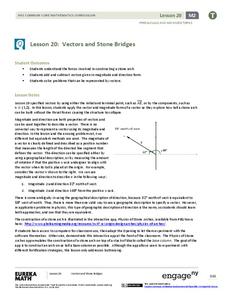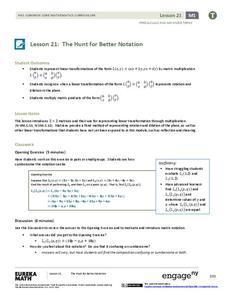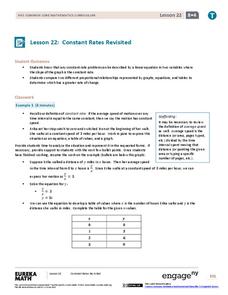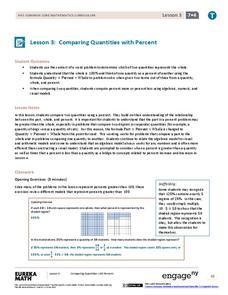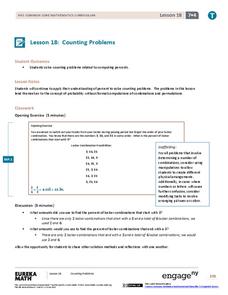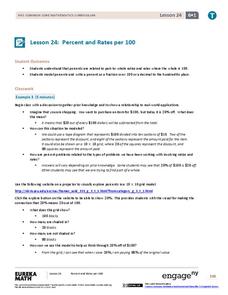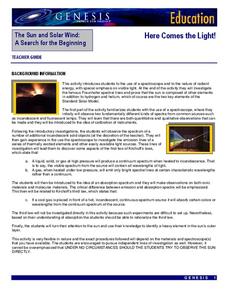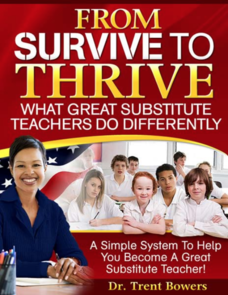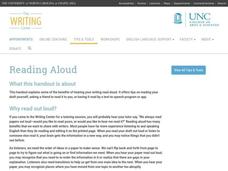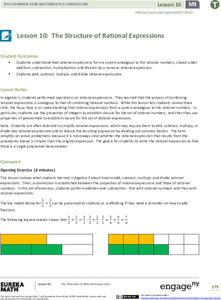National Energy Education Development Project
Exploring Nuclear Energy
Every 18–24 months, nuclear power plants shut down to remove their used uranium fuel, a radioactive waste. Show learners how energy is made and used around the world and then focus on the United States' usage. Viewers then specifically...
EngageNY
Getting a Handle on New Transformations 1
In the first of a two-day lesson on transformations with matrix notation the class transforms the unit square using general transformations, then calculates the area of the transformed image. They discover it is the same as finding...
EngageNY
Vectors and Stone Bridges
What does it take to build a stable arch? Pupils apply vectors and physics as they examine arched bridges and their structural integrity. They use vectors to represent the forces acting on the stone sections and make conclusions based on...
Teach Engineering
Where Are the Plastics Near Me? (Field Trip)
With a piece of plastic here and a piece of plastic there, here a piece, there a piece, everywhere a piece. Teams go on a field trip in order to document the locations and kinds of plastic trash in an area near them. The eighth...
EngageNY
The Hunt for Better Notation
The matrix — it's not just a movie. The lesson introduces the concept of 2 x 2 matrix multiplication as a way to represent linear transformations. Class members determine when a linear transformation represented as matrix...
Teach Engineering
Ice, Ice, PV!
Knowing the temperature coefficient allows for the calculation of voltage output at any temperature. Groups conduct an experiment to determine the effects of temperature on the power output of a solar panel. The teams alter the...
Messenger Education
Look But Don’t Touch—Exploration with Remote Sensing
Mars is home to the tallest mountain in our solar system, Olympus Mons. In this set of two activities, learners review geologic land formations through the analysis of aerial maps. They then apply this knowledge to aerial maps of objects...
EngageNY
Constant Rates Revisited
Find the faster rate. The resource tasks the class to compare proportional relationships represented in different ways. Pupils find the slope of the proportional relationships to determine the constant rates. They then analyze the...
EngageNY
Using Tree Diagrams to Represent a Sample Space and to Calculate Probabilities
Cultivate the tree of knowledge using diagrams with two stages. Pupils create small tree diagrams to determine the sample space in compound probability problems. The instructional activity uses only two decision points to introduce tree...
EngageNY
Comparing Quantities with Percent
Be 100 percent confident who has the most and by how much. Pupils use percentages to help make the comparisons by finding what percent one quantity is of the other. They also determine the percent differences between the two...
EngageNY
Counting Problems
Solving these percent problems is a matter of counting. Pupils find percents by counting the number of events that meet the criteria and the total number of possibilities. Participants create the ratio and convert it to a percent to...
EngageNY
Percent and Rates per 100
What percentage of your class understands percents? Pupils learn the meaning of percents based upon rates per 100 in the 24th lesson in a series of 29. They represent percents as fractions, decimals, ratios, and models. The scholars...
EngageNY
End-of-Module Assessment Task: Grade 6 Math Module 3
The last installment of a 21-part module is an end-of-module assessment. Individuals show their understanding of positive and negative numbers on the number line, absolute value, and the coordinate plane in a variety of contexts.
Columbus City Schools
Biome Basics with a Disastrous Twist
Bored with your current biome bag of tricks? This bundle is a bountiful bag of biome fun! Travel the globe with seventh graders and explore the biotic and abiotic factors that define our world's biomes. Then, introduce a little...
NOAA
Chemosynthesis and Hydrothermal Vent Life
What's life like in a hydrothermal vent? Find out in part five of a 13-part series. Learners journey to one of the harshest environments on the planet, the hydrothermal vent, to learn about the creatures that survive the extreme...
NASA
Here Comes the Light!
Look beyond the light! An engaging activity introduces young scholars to the application of a spectroscope. The lesson is the fifth in a series of six and focuses on the analysis of the elements of the sun.
Worthington City Schools
From Survive to Thrive: What Great Substitute Teachers Do Differently
Thinking about signing up as a substitute teacher? Subbing is not for the faint of heart but with the help of the thoughtful advice in a detailed guide, you can develop the skills you need to be a great, professional substitute teacher.
University of North Carolina
Reading Aloud
Warning: reading your paper aloud may cause bystanders to think you're talking to yourself. However, as the 14th installment of 24 in the Writing the Paper series from UNC explains, it is one of the best strategies for revision. Through...
University of North Carolina
Introductions
You never get a second chance to make a first impression. According to the 11th handout in the 24-part Writing the Paper series, that's why writing a strong introduction is so important. The handout offers strategies for crafting...
Corbett Maths
3D Pythagoras
Calculate one hypotenuse then repeat. The resource provides a variety of ways for finding the length of the diagonal in a prism. Using the Pythagorean Theorem, pupils find a variety of distances in 3-D figures. The distances range from...
EngageNY
Grade 10 ELA Module 2: Unit 1, Lesson 13
Freedom is not free. Scholars write to a prompt analyzing two pieces of work that develop ideas about freedom. Readers compare “Freedom” by Rabindranath Tagore and "Letter from Birmingham Jail" by Martin Luther King Jr. Learners work...
Rice University
Calculus Volume 2
Delve into the middle of calculus. The resource is the second eBook of three that covers the complete calculus content. Seven chapters begin with integrals and different methods of integration before moving on to differential equations....
EngageNY
Introducing Module 2: Working Conditions—Then and Now
Let's get visual! Scholars embark on a gallery walk around the classroom to view quotes, images, and videos about historical and modern working conditions in various professions. They consider how working conditions have changed over...
EngageNY
The Structure of Rational Expressions
Find out when rational expressions are closed. Pupils review adding, subtracting, multiplying, and dividing with rational numbers to make the connections to operations with rational expressions. Using specific examples, learners notice...
Other popular searches
- Spending Money
- Government Spending
- Budgets and Spending
- Spending and Saving Money
- Deficit Spending
- Consumer Spending
- Spending a Million Dollars
- Math Spending Money
- Spending Money Worksheet
- Spending Money Wisely
- Personal Spending
- Saving Spending Money


